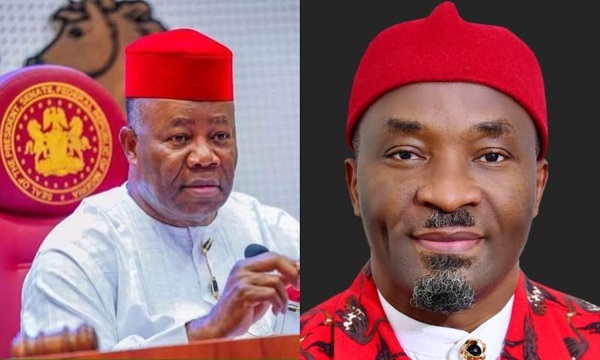450
By Tracy Moses
With less than two years to the next general elections, calls for sweeping reforms to overhaul Nigeria’s democratic system grew louder on Monday as the Inter-Party Advisory Council (IPAC), Senate President Godswill Akpabio, and Deputy Speaker of the House of Representatives, Rt. Hon. Benjamin Kalu, demanded urgent constitutional and electoral changes to strengthen governance and restore public confidence ahead of 2027.
Speaking at a consultative meeting organised by the House Committee on Constitution Review with political party leaders in Abuja, IPAC National Chairman, Dr. Yusuf Mamman Dantalle, commended the National Assembly for initiating broad-based conversations aimed at addressing persistent gaps in the nation’s democratic framework.
He described the review as critical to rebuilding trust in state institutions and correcting electoral flaws that have plagued past elections. According to Dantalle, as the umbrella body for all registered political parties and a key stakeholder in leadership recruitment, IPAC is committed to championing reforms that would entrench transparency, credibility, and inclusivity in Nigeria’s political process.
He urged lawmakers to abolish State Independent Electoral Commissions (SIECs) and transfer the responsibility of conducting local government elections to the Independent National Electoral Commission (INEC). Doing so, he argued, would ensure credible grassroots polls and strengthen governance from the bottom up.
Dantalle further proposed removing the President’s power to appoint the INEC Chairman, national commissioners, and secretary. Instead, he advocated the creation of an Independent Appointment Committee comprising representatives of political parties, civil society, the National Judicial Council (NJC), and the National Assembly.
Other recommendations include restoring public funding for political parties to create a level playing field, establishing an Electoral Offences Commission to prosecute electoral crimes such as vote-buying and result manipulation, and reserving special legislative seats for women to boost female participation in governance. He also proposed allowing political parties to fill legislative vacancies caused by death or defection without expensive by-elections.
“The ongoing constitution review is an opportunity to deliver a people’s constitution that reflects our collective aspirations,” Dantalle said, stressing that judicial independence and stronger human rights protections remain vital for sustaining democracy.
Senate President Godswill Akpabio also called for bold and comprehensive reforms to ensure that democracy not only survives but thrives. He described the constitution review process as “historic and transformative,” insisting that Nigeria’s supreme law must evolve to address contemporary challenges, including electoral credibility, justice, inclusion, and security.
Akpabio emphasised that credible elections and an impartial judiciary are indispensable to democracy, warning that public trust collapses when elections are flawed or justice delayed. He renewed calls for full local government autonomy, arguing that effective governance begins at the grassroots and that financial independence for local councils is key to improving service delivery and deepening federalism.
“No democracy can flourish while excluding half of its population,” he said, calling for greater women’s representation in governance. Akpabio also backed the creation of state police as a pragmatic solution to Nigeria’s security challenges, but cautioned that such a system must operate within human rights safeguards.
Reaffirming the National Assembly’s commitment to work with the executive and stakeholders, he vowed that lawmakers would pass legislation to strengthen institutions and enhance accountability. “The Constitution is not a piece of paper; it is the promise of a people,” he declared. “If we remain true to these ideals, future generations will say of us: here were leaders who did not merely speak of change but made it happen.”
Kalu: Most Inclusive Constitution Review in History
Deputy Speaker and Chairman of the Constitution Review Committee, Rt. Hon. Benjamin Kalu, described the ongoing review as the most inclusive in Nigeria’s history. Twenty-six years after the 1999 Constitution came into effect, he said it was imperative to assess whether it still meets present-day realities.
Kalu noted that the committee had held extensive consultations with legal experts, civil society organisations, traditional rulers, and other stakeholders, including zonal public hearings. He emphasised the central role of political parties in the process, given their influence in recruiting candidates, mobilising voters, and shaping policies.
Highlighting key proposals, including guaranteed women’s representation, local government financial autonomy, and streamlined electoral processes, Kalu urged political parties to study the bills carefully and submit constructive inputs.
“These reforms go beyond partisan interests; they are essential to the future of our democracy,” he said. “We must give women their rightful place, empower local governments to serve their people, make our elections credible, and our courts efficient. This is the task before us, and we cannot achieve it without your partnership.”



